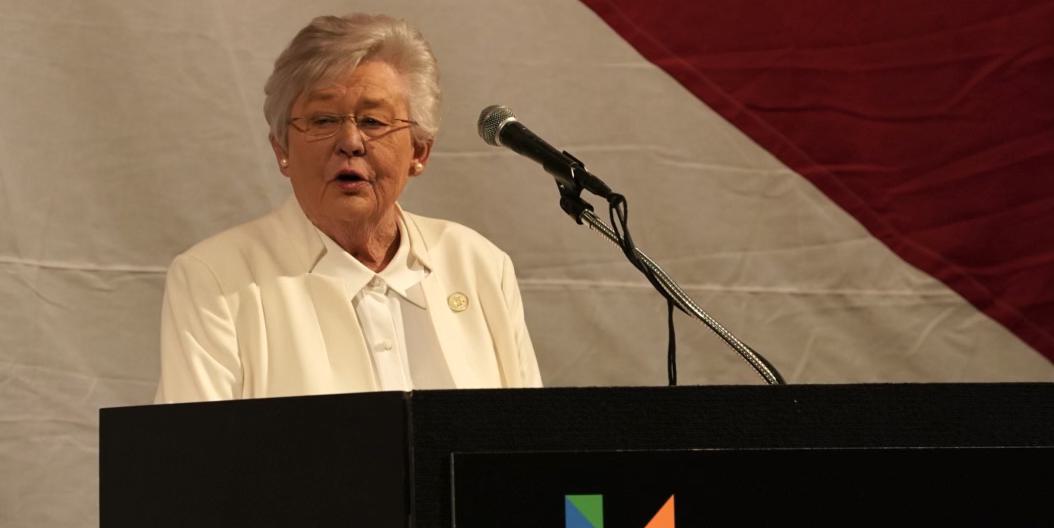Alabama Gov. Kay Ivey (R) announced on Thursday that she has signed the $8.26 billion Education Trust Fund budget (ETF) – the largest in state history. The state will spend $8,261,590,649 on education in the 2023 fiscal year, nearly $600 million more than in the FY2022 budget.
Ivey made the announcement while speaking to the Huntsville/Madison County Chamber of Commerce. Ivey told the crowd of around 1,000 business and community leaders that the state is making strategic investments in its students.
“Here in Alabama, we are renewing our focus on the basics, and that is teaching core instruction to our students,” Ivey said. "This year’s historic Education Trust Fund wisely targets our dollars to accomplish this mission. During my State of the State address, I stated that we should no longer accept the existence of failing elementary schools in our state, and this budget strategically directs money, using a customized approach, to meet the particular needs of those struggling schools as we begin the process of working towards achieving this goal. "
The budget will add pre-k classrooms, provide math coaches, fund after-school programs, give a pay raise to teachers, and incentivize experienced teachers, among other things.
While revenues are spent in record amounts, the governor and the Legislature have been disappointed by Alabama’s public school rankings. Ivey and the Legislature are hoping that more money for schools, including more money for teachers, auxiliary teachers, substitute teachers, books and materials and the State Department of Education, will improve the state’s educational position in comparison with the rest of the country.
“We are continuing our fiscally conservative approach and are fully funding the ETF’s rainy day fund for the first time in history, completely paying off the state’s PACT liability years earlier than anticipated, and…making investments that will directly benefit our students and teachers for years to come,” Ivey said. “As someone who was a former teacher, I believe strongly that education is the number one issue here in Alabama and across our nation, because with that strong educational foundation, doors will open for the rest of one’s life.”
Some conservatives are disappointed with the Legislature’s budget for education. A bill by State Sen. Del Marsh (R-Anniston) that would have allowed 4.84% of that ETF money to follow children to private schools faced a wall of bipartisan opposition from legislators and never made it out of the Senate. The legislature did little to increase school choice for Alabama families during this session.
Some fiscal conservatives lamented the increased spending and the lack of substantive tax reform in this budget. A bill by State Rep. Mike Holmes (R-Wetumpka) to end the state's 4% sales tax on food did not get out of the House of Representatives. Democrats Penny McClammy and Mary Moore also introduced bills to end the grocery tax. None of the three bills made it out of committee. Meanwhile, the record state budget created more government jobs and increased the pay for those in the public sector.
Alabama Policy Institute's Justin Bogie wrote that “total state spending has increased by more than 17% since 2019. Over that same time, year-over-year revenue increases have totaled $2.5 billion. Over $361 million of that new revenue came from the $.10 gas tax increase passed by the Legislature at the start of the quadrennium. Despite the pandemic, there have also been sharp increases in individual and corporate income tax collections as well as online and in-person sales tax receipts, among others.”
The Legislature also passed the Numeracy Act to hire math coaches to teach Alabama’s teachers how to better teach math, they passed legislation to hire 149 mental health coordinators for public schools, and they passed legislation to clarify the requirements of the Alabama Literacy Act.
“The newly-created Numeracy Act will follow the model set by proven successful programs like ARI and the Alabama Literacy Act in order to concentrate educational resources on an obvious problem in need of addressing,” wrote Alabama Education Policy Committee Chair State Rep Terri Collins (R-Decatur). ”As part of the first major overhaul and reform of state mental health services since Gov. Lurleen Wallace’s administration, the Legislature passed a measure requiring each school system across Alabama to employ a mental health service coordinator.”
The Legislature also spent an additional $1.2 billion in the supplemental appropriation for education during the current 2022 fiscal year. That money will be reaching state agencies, the state department of education, local school boards, and the state’s colleges and universities in the coming weeks.
While the anticipated $8.3 billion in anticipated revenues for the Education Trust Fund are a record amount, legislators told 1819 News that according to some estimates the real revenue amount will likely be around $9 billion.
Ivey is running for re-election in the May 24 Republican primary, where she faces eight challengers.
To connect with the author of this story, or to comment, email brandon.moseley@1819News.com.










